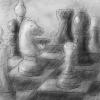I must say, a lot of the words exchanged in favor of this show little understanding of how any of the technical or artistic side of game development.
I'll try to throw my opinion in here, without restating what's said before too much.
Interpreting the words literally, an "initial game idea" has a worth of near nothing, and I'll tell you why: only the end result of proving the concept has value, and most "idea guys" come up with the same ideas that both artists and programmers can come up with, and need to fix.
I hold not value in the ideas of someone that has no hand in any other aspect of the game development process for one good reason: "idea guys" who have a hand in actually implementing ideas are the ones who come up with really good ideas. I get so many friends and acquaintances that suggest either making clones, or making games that are ridiculously impractical games and cannot be convinced that what they are suggesting will take a lot more effort than they think for the amount of reward that they want.
Don't get me wrong, there is a chance that someone who has no idea what goes into making a game can come up with a good idea, but people that are experienced can expedite the process of hammering away at the faults of the idea, by already knowing what needs work before drawing up the original plans.
In this region, "nerd" is a derogatory term for someone in the information technology field, typically used by people with no respect for them. If you feel that most gamers are boring people, then I think that you might be in the profession for the wrong reason, like a social worker thinking that people down on their luck are lazy, or a chef thinking that people that eat at a restaurant are lacking merit. If you have no respect for the people that you work with, or the people that buy your product, then I would have a hard time imagining what joy you might find in the field.
Now, back on topic, the way most people see an "idea guy" is a person that wants something either already done or not worth doing, but wants no part in actually doing it, and expects others to do it for free. The truth is, most idea guys don't have enough of an idea to actually put forth a game. Their idea spans a single page, at most, and leaves a ton of details out, that the programmer is expected to come up with. I'll give you a quick example:
"A game like Pokemon, but different: people can see each other in the fields, and battle each other, and there world will be expanding through downloadable updates, with new areas."
Pokemon clones are very popular. However, there is a lot missing. In fact, the whole game. How exactly do players interact? How does the battle system prevent cheating? How do you prevent too many people from being in the same area, since there are only a certain number of tiles in an area? How will the network be laid out? There's a lot of work in "just letting everyone see each other at once and interact in real-time". How will the downloadable data be handled? Is it done with a scripting language, to allow events and such? What capabilities should it have, to allow more than what you've imagined right now? Routes in Pokemon have a finite amount of exits; adding another area requires modifying areas that previously existed on one's local machine. How do you handle a player that was last in a location that was modified in an update? Perhaps they are now in a tile that is not walkable, or they're surfing where there's no longer water. Updates don't just happen for new content; if the map has a bug, that needs to be reworked. How does one "save"? If they simply return to the last position they were when they logged off, how do you prevent people from reappearing in the same coordinate when they log on at the same time? If they are merely bumped to the next tile, what if that isn't possible? How do you prevent more people from reappearing in the same area, either by exiting a building or logging back on, than the limit imposed on that area? If they get dropped at a neutral starting point, what happens if that is full?
The list is nearly infinite, full tiny details in that one simple idea the idea guy had. Most of them only concerned one topic. Most people that only provide ideas are usually incapable of figuring all this out, and instead leave it to the "nerds" to hash out essentially the whole game. People look for you to provide an equal amount of work relative to everyone else on the team. If your idea of design is giving a starting point, and having everyone that implements it figure it out, they you aren't the idea guy, you're a muse, and everyone else is the idea guy, that started from your idea.
If you can provide a fully fleshed out idea, covering just about all aspects (which requires experience in the field), and can produce a many paged proposition and design, following the life cycle from start to finish, then you are more welcomed on the team as a distinct role.
Put another way, if the programmers and artists can come to you with problems in the design and implementation, and you can resolve those problems, then you'd be worth something to the team. If you provide an idea, and you can't give anything more than that, then your role is very limited.
Providing an analogy, a lot of programmers look at "idea guys" the same way that that web developers look at people who want a website done, but want it done by Friday, and also want it to have a giant Flash slideshow on the homepage with Comic Sans font for all of the tabs that make a "Whoosh!" sound, and make it look just like their competitor's site.







